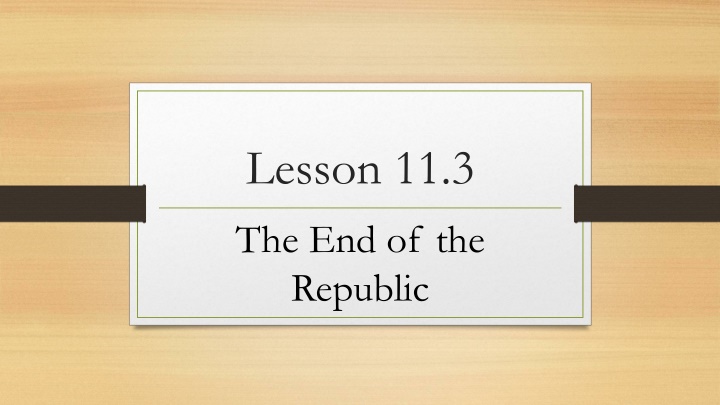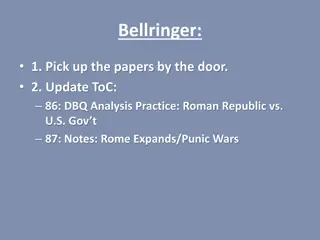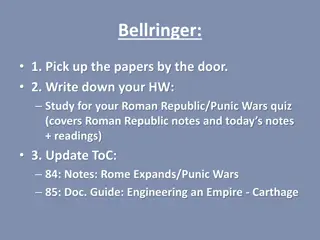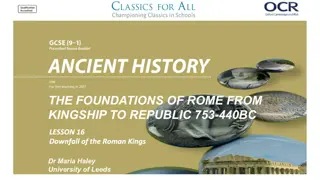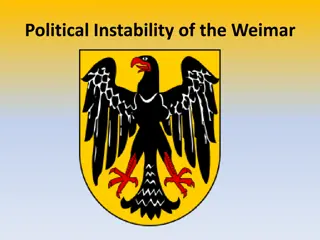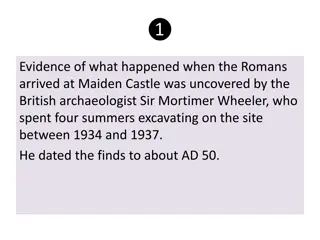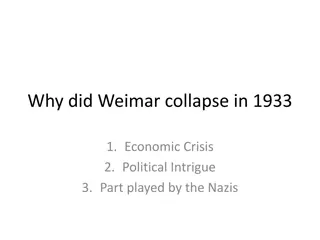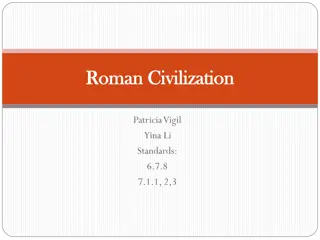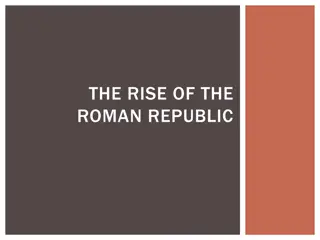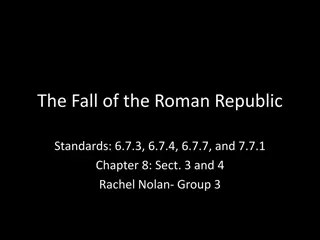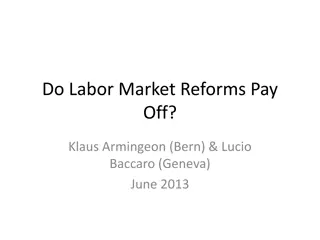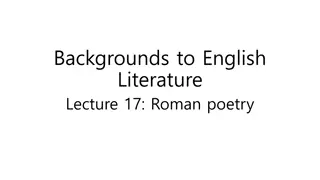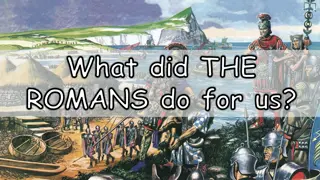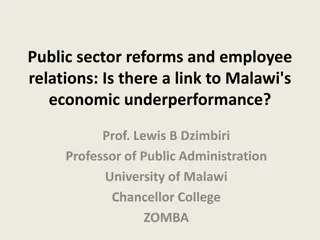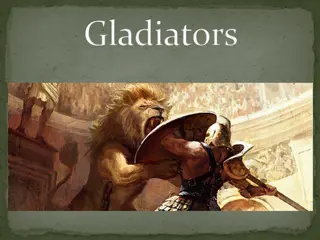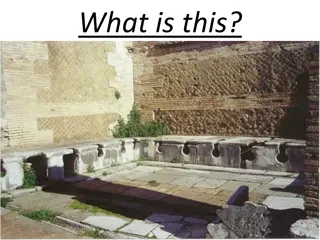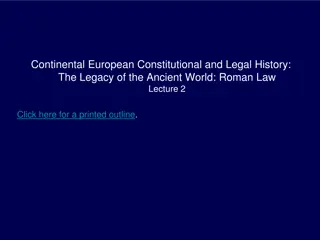The Decline of the Roman Republic: Economic Troubles and Political Reforms
The Roman Republic faced economic challenges as wealthy landowners dominated politics, leading to the impoverishment of farmers and the rise of unemployment in cities. Reformers like the Gracchus brothers sought to redistribute land, but faced opposition from the Senate. Military transformations under leaders like Marius and Sulla further fueled political conflicts, paving the way for the eventual rise of Julius Caesar.
Uploaded on Sep 25, 2024 | 1 Views
Download Presentation

Please find below an Image/Link to download the presentation.
The content on the website is provided AS IS for your information and personal use only. It may not be sold, licensed, or shared on other websites without obtaining consent from the author.If you encounter any issues during the download, it is possible that the publisher has removed the file from their server.
You are allowed to download the files provided on this website for personal or commercial use, subject to the condition that they are used lawfully. All files are the property of their respective owners.
The content on the website is provided AS IS for your information and personal use only. It may not be sold, licensed, or shared on other websites without obtaining consent from the author.
E N D
Presentation Transcript
Lesson 11.3 The End of the Republic
I. Problems in the Republic The Roman army won victories abroad, but the republic faced mounting economic troubles at home. A. Romans Rich and Poor 1. The plebeians had made some political gains in the republic, but they lacked real power. It was the patricians who held power, made up most of the Senate, and managed Rome s finances and directed its wars.
Romans Rich and Poor 2. In the 100s BC., farmers began to fall into poverty and debt. Meanwhile, the wealthy Romans owned latifundia, large farming estates, and relied on the thousands of prisoners captured in wars to work their land.
Romans Rich and Poor 3. Small farms shut down and thousands of poor unemployed people poured into Rome's cities but found paying jobs hard to find. 4. Mounting anger among the poor worried Roman leaders, so they began offering cheap food and entertainment, or bread and circuses to the poor.
B. Roman Reformers 1. Brothers Tiberius and Gaius Gracchus, thought that Rome s problems were caused by the actions of wealthy landowners. They urged the Senate to take some land from the latifundia and return it to the poor. 2. But the Senate was made up of wealthy Romans, and they fought the brothers proposals.
C. Roman Politics and the Army. 1. Marius transformed the army in order to provide opportunities to the poor. In return for military service, he paid soldiers wages and promised them land. 2. The creation of a professional army led to many power struggles. General Sulla opposed Marius plan and declared himself dictator.
C. Roman Politics and the Army. 3. For three years, Sulla made changes to the government, reducing the power of the tribunes and giving senators more responsibilities. But, Rome plunged into conflict that lasted for 50 years.
II. The Rise of Julius Caesar After Sulla, three men ruled the Roman Republic: Crassus, Pompey and Julius Caesar. These three formed the First Triumvirate to rule Rome.
A. Caesars Conquests 1. Each Triumvirate member commanded a different military post. Pompey led in Spain, Crassus in Syria and Caesar in Gaul. While in Gaul, Caesar won the admiration and support of the poorer classes.
A. Caesars Conquests 2. By 50 B.C., the First Triumvirate no longer existed and the Senate ordered Caesar to give up his army and return to Rome. Instead, he gathered his troops and crossed the Rubicon this small river separated his military command area from Roman Italy.
A. Caesars Conquests 3. Realizing that he was starting a civil war, Caesar and his soldiers swiftly captured all of Italy.
B. Caesar Takes Power 1. In 44 B.C., Caesar took over the Roman government, declared himself dictator for life, and appointed people to the Senate who supported him. 2. Meanwhile, Caesar introduced many reforms that made him popular with the Romans, especially the poor.
B. Caesar Takes Power 3. One of the most famous reforms he introduced was the creation of a new calendar with 12 months, 365 days and a leap year this became known as the Julian calendar. 4. This calendar changed slightly to become the Gregorian calendar that is based on the date of the birth of Jesus this is the calendar that is still used by most countries in the world today.
B. Caesar Takes Power 5. Many Romans praised Caesar. But some however hated him. They believed he wanted to be king and plotted to kill him. His opponents gathered around him as he entered the Senate and stabbed him to death in 44 B.C.
III. From Republic to Empire After Caesar's death, civil war broke out, and Caesar s 18-year-old grandnephew, Octavian, joined Mark Antony and Marcus Lepidus to form the Second Triumvirate.
A. Antony and Cleopatra 1. After Lepidus retired from politics, Octavian and Antony became rivals. Antony and Cleopatra formed an alliance and Octavian saw this as a threat, believing that Antony planned to make himself the sole ruler of the republic.
A. Antony and Cleopatra 2. Many Romans were alarmed at this news and this enabled Octavian to declare war on Antony. 3. At the Battle of Actium, Octavian s forces defeated those of Antony and Cleopatra. Within a year, Octavian captured Alexandria and made Egypt Roman territory. Octavian became the supreme ruler of Rome.
B. Octavian A New Direction 1. Publically, Octavian voiced his support for a republic. Privately, however, he felt differently. 2. He believed that a republican government was too weak to solve Rome s problems, and that they needed a strong leader.
B. Octavian A New Direction 3. With a strong and loyal army supporting Octavian, the Senate consented to his wishes, declaring him counsel, tribune, and commander-in-chief for life. Changing his title to Augustus, he became Rome s first emperor, or all-powerful ruler.
Lesson 11.4 Rome Builds an Empire
I. The Rule of Augustus For nearly 200 years, the Roman world enjoyed peace and prosperity, a time know as the Pax Romana, or Roman peace.
I. The Rule of Augustus A. What Reforms did Augustus Make? 1. Determined to protect the empire, Augustus created a permanent professional army, complete with a special unit known as the Praetorian Guard.
I. The Rule of Augustus 2. Augustus also established the empire s boundaries along natural physical features: the Rhine and Danube rivers, the Atlantic Ocean, the Sahara Desert and the Euphrates River. Troops were stationed along these frontier areas to protect the empire from invaders.
I. The Rule of Augustus 3. He also had many public buildings, fountains, and palaces rebuilt to reflect the greatness of Rome.
I. The Rule of Augustus 4. Augustus also worked to improve Rome s government. He named an official called a proconsul, or governor, to oversee each of Rome s provinces. 5. Augustus made tax collectors permanent government officials and paid them regular wages.
I. The Rule of Augustus 6. He also changed Rome s legal system by creating a code of laws for people living in the provinces who were not Roman citizens. Still, this system often favored the authority of the empire over individual citizen s rights.
B. Emperors After Augustus 1. After Augustus died, his adopted son Tiberius became emperor. After Tiberius, three other emperors from Augustus s family ruled Rome. These Julio-Claudius emperors were Caligula, Claudius, and Nero. 2. While Tiberius and Claudius governed the empire effectively, Caligula and Nero proved to be cruel rulers.
II. The Roman Peace After Nero died, violence erupted throughout the Roman Empire. A general named Vespasian became emperor. Although he restored order, he treated harshly anyone who opposed Roman rule and crushed several uprisings throughout the empire.
II. The Roman Peace 1. Vespasian began the construction of the Colosseum in central Rome. After he died, Vespasian s sons each governed Rome and ruled during an era of relative growth and prosperity.
A. Five Good Emperors 1. During the early A.D. 100s, several emperors not related to Augustus or Vespasian ruled the empire. These five good emperors did not abuse their power and are considered to be some of the most capable in Rome s history. 2. They introduced programs to help the empire s people and improve Roman cities.
B. A United Empire 1. While the Emperor Trajan expanded the Roman Empire to its maximum size, his successors believed that the empire had become too large to rule effectively. They withdrew Roman forces from regions they could not defend and reinforced areas that were easier to protect.
B. A United Empire 2. By the A.D. 100s, the Roman Empire was one of the largest empires in history. 3. By A.D. 212, every free person within the empire was considered a Roman citizen who was treated equally under Roman laws.
C. The Empires Economy 1. Agriculture remained the most important economic activity in the Roman Empire. Industry thrived in the cities and Rome exported goods. 2. Merchants used the same money in Gaul, Greece, and Egypt as they did in Rome. People also used a standard system of weights and measurements.
C. The Empires Economy 3. A network of paved roads extended throughout the empire and goods could be shipped safely to and from the empire s ports. 4. Traders from all over the empire arrived in Rome s port cities. Trade made many people wealthy, however most city dwellers and farmers remained poor, and many other people remained enslaved.
